Key takeaways:
- SME development is vital for economic growth, requiring more than financial support—mentorship fosters skills, collaboration, and resilience.
- Mentees experience transformative growth through encouragement, relationship building, and overcoming challenges with mentor support.
- Effective mentorship involves being present, transparent, and adaptable to individual mentee needs while balancing guidance with independence.

Understanding SME Development
Developing Small and Medium Enterprises (SMEs) is crucial for a country’s economic growth. I’ve seen firsthand how SMEs create job opportunities and foster innovation. Isn’t it fascinating how a small idea can blossom into a thriving business that supports an entire community?
One specific experience I had involved guiding a local café owner who had a passionate vision but struggled with the technical aspects of running a business. Through mentoring, I watched her transform her dream into a successful establishment. It struck me how the right support can unlock potential and lead to significant change—have you ever witnessed such a transformation?
Understanding SME development goes beyond just financial support; it encompasses the nurturing of skills and capabilities. I remember hosting workshops where aspiring entrepreneurs shared their struggles with marketing. This exchange of ideas not only empowered them but also reinforced the importance of collaboration. Isn’t it exciting how sharing knowledge can elevate everyone’s journey?
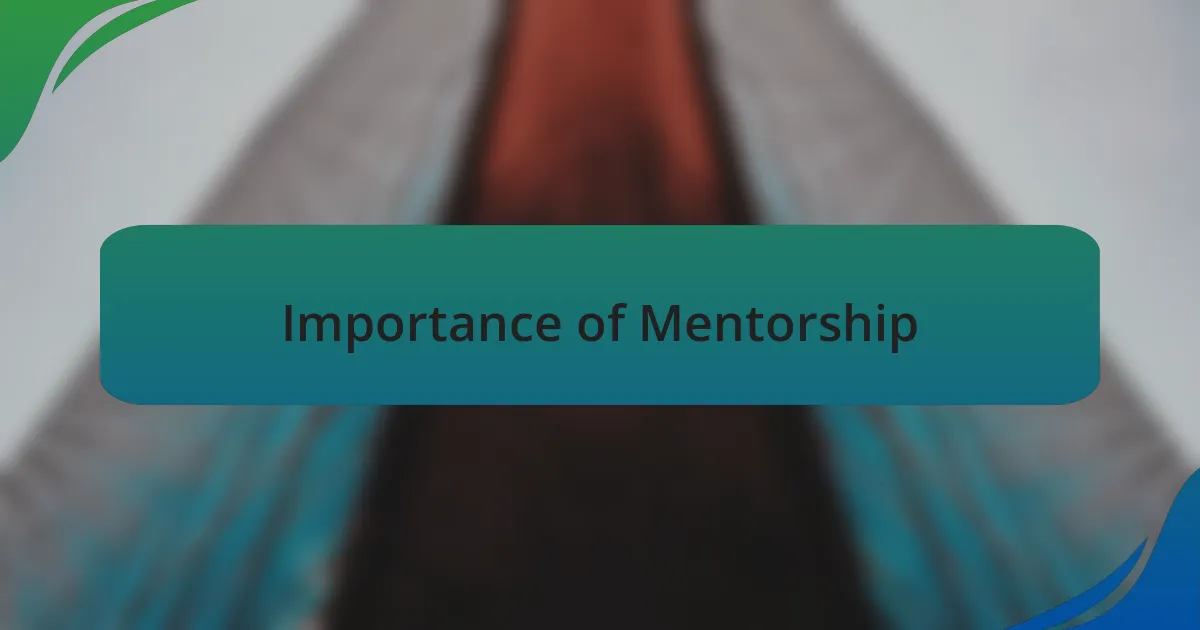
Importance of Mentorship
Mentorship plays a pivotal role in the growth of SMEs, as it bridges the gap between aspiration and achievement. I recall mentoring a budding entrepreneur who was overwhelmed with self-doubt. Through our discussions, I provided not only guidance but also encouragement, which helped her build confidence. Isn’t it remarkable how a few supportive words can ignite someone’s belief in themselves?
When I think about the lasting impact of mentorship, I remember a time when I organized a community leadership program. During this initiative, I paired experienced business owners with novices to facilitate skill sharing. The transformation I observed was astonishing—participants forged connections that transcended business; they became a supportive network. Isn’t that the essence of mentorship? It nurtures relationships as much as it develops skills.
Moreover, mentorship fosters resilience in SMEs. I once coached a group of startup founders who faced failure after their initial product launch. Instead of giving up, we worked collaboratively to analyze their mistakes. By reframing their setbacks as learning experiences, I saw a renewed determination among them. Isn’t it empowering to turn challenges into stepping stones for future success?
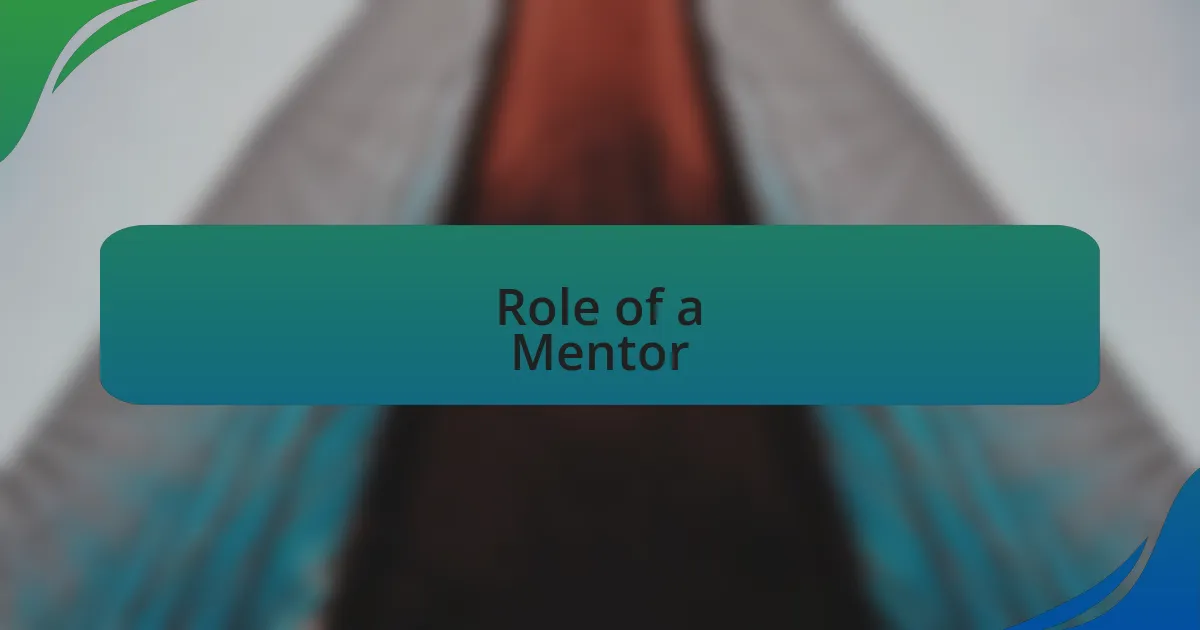
Role of a Mentor
A mentor serves as a guiding light, offering insights that can illuminate the often murky waters of business challenges. I remember a mentee who was struggling with a pivotal decision—whether to pivot his business model. Through our conversations, I provided a space for him to weigh his options without judgment, ultimately helping him discover the path that aligned with his vision. It’s amazing how simply listening can empower someone to find clarity.
The role of a mentor is not just about imparting knowledge; it’s about cultivating a relationship grounded in trust and mutual respect. I once had a mentee express her fear of presenting her ideas to potential investors. Together, we practiced her pitch, honing her delivery while boosting her self-assurance. Have you ever felt that rush of confidence when you finally conquer a fear? That’s what mentorship can evoke—a sense of readiness to face the world.
Moreover, mentors are crucial in fostering a culture of lifelong learning. I’ve observed that when mentees embrace curiosity and continuous improvement, they not only grow professionally but personally as well. Just last year, I suggested that one of my mentees attend a workshop outside his comfort zone. Watching him thrive in that environment was a reminder of how stepping into the unknown can lead to remarkable growth. Isn’t it fascinating how growth often happens in the most unexpected places?
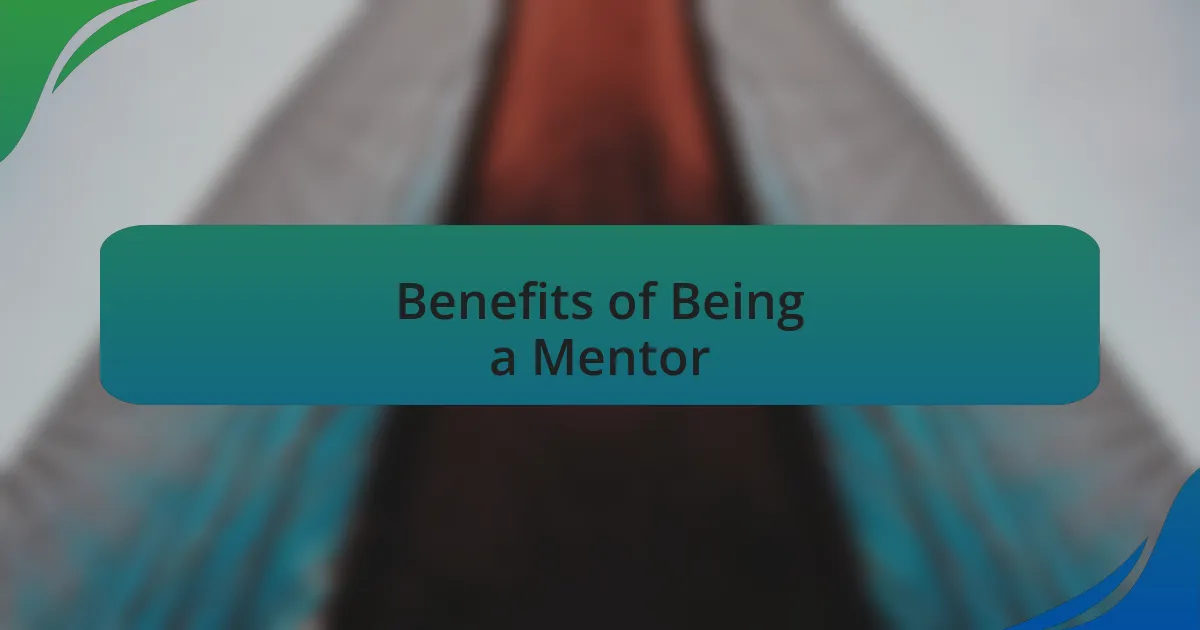
Benefits of Being a Mentor
One of the most rewarding aspects of being a mentor is witnessing the transformation of my mentees. I recall a time when I mentored a young entrepreneur hesitant to network. After encouraging him to attend events, I observed him confidently initiating conversations with industry leaders. It struck me how mentorship can ignite a flame of confidence in someone, illuminating their journey toward success.
Furthermore, mentoring cultivates invaluable skills within myself. As I guide others, I refine my abilities in communication and problem-solving. For instance, preparing for our session often pushes me to research current trends and best practices. This reciprocal learning fosters not just my growth but enhances the overall quality of the mentorship experience. Isn’t it remarkable how teaching others deepens our understanding of our own craft?
Lastly, the relationships built through mentorship can lead to a supportive community. I’ve found that mentorship often blossoms into lasting friendships, providing a network of encouragement. After completing a project with a former mentee, we still exchange ideas and support each other’s ventures. Have you noticed how those connections can sometimes become as significant as the lessons learned? Mentorship truly creates a web of interdependence that benefits everyone involved.
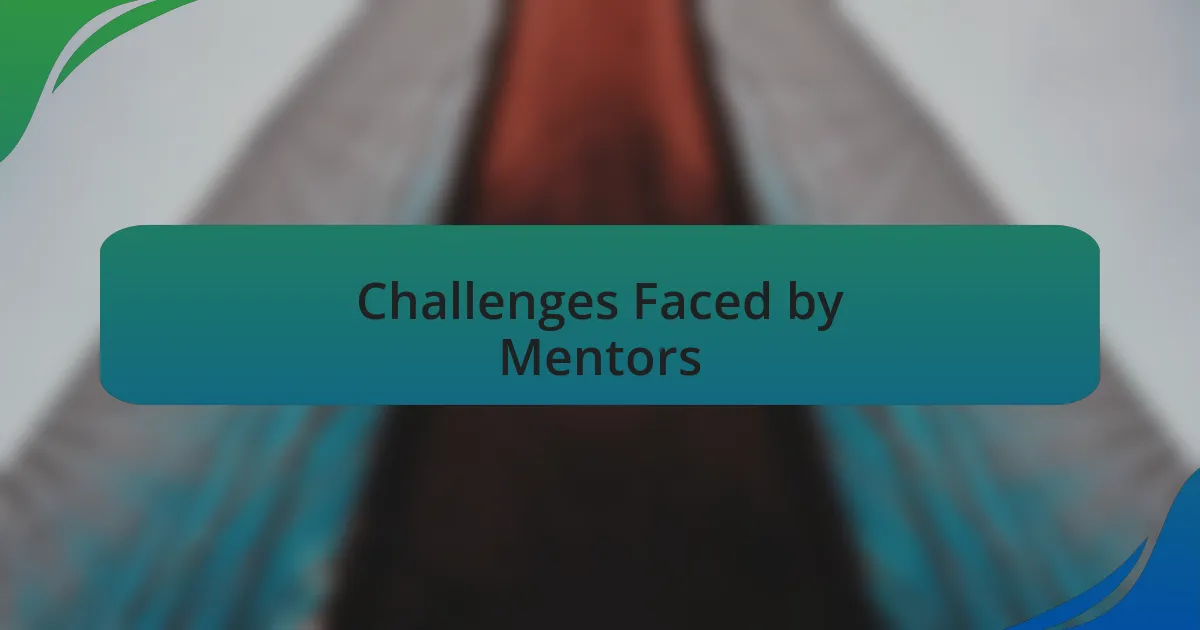
Challenges Faced by Mentors
Mentoring comes with its own set of challenges that can sometimes feel daunting. One struggle I’ve faced is finding the right balance between guidance and letting my mentees navigate their own paths. I recall a particular instance when I was overly involved in a mentee’s project. My intention was to support, but it ended up hindering their independence. This taught me that pushing too hard can stifle growth, and it’s essential to step back and allow them to make their own decisions.
Another challenge lies in managing expectations. It can be difficult to ensure that my mentees understand the realities of their ambitions. I remember mentoring a talented individual who had grand plans but lacked a solid execution strategy. It was tough to watch them grapple with setbacks, and I often questioned if I was providing the right support. How do we set realistic goals without dampening enthusiasm? This balance requires constant communication and patience, which can be both exhausting and rewarding.
Time constraints also represent a significant barrier in the mentoring relationship. Juggling my schedule while being present for others often feels like walking a tightrope. I once overcommitted to multiple mentees, and the quality of my guidance suffered. Have you experienced the strain of balancing commitments? This made me realize the importance of setting clear boundaries and prioritizing where my mentorship will have the most impact.

Personal Experiences in Mentorship
One of my most fulfilling experiences as a mentor was witnessing a mentee transform their self-doubt into confidence. Early on, this individual struggled to articulate their ideas during our sessions. I remember one meeting when they presented a project proposal with visible anxiety. I encouraged them to view their struggles as opportunities for growth rather than obstacles. Watching them flourish over time was incredibly rewarding—it highlighted just how powerful a little encouragement can be.
In another instance, I faced the emotional challenge of navigating a mentee’s personal hardships while aiding their professional development. It was eye-opening to learn how intertwined personal and professional lives can be. One particularly difficult moment occurred when a mentee confided in me about their family situation affecting their focus. I had to remind myself that mentorship also means being a compassionate listener, not just a career advisor. How do we create a safe space for vulnerability while still encouraging ambition? It’s a balancing act that deepened my empathy and reinforced the need for genuine connection.
There have also been times when I questioned my effectiveness as a mentor. I recall an ambitious mentee who seemed to lose motivation midway through our sessions. Their untapped potential weighed heavily on my thoughts. I found myself wondering if I had missed something critical in our discussions. This led to constructive self-reflection about my mentoring style and the importance of continually adapting to meet the unique needs of each individual. Do we truly understand ourselves as mentors in the same way we strive to understand our mentees? This introspective journey has profoundly shaped my approach to mentorship.
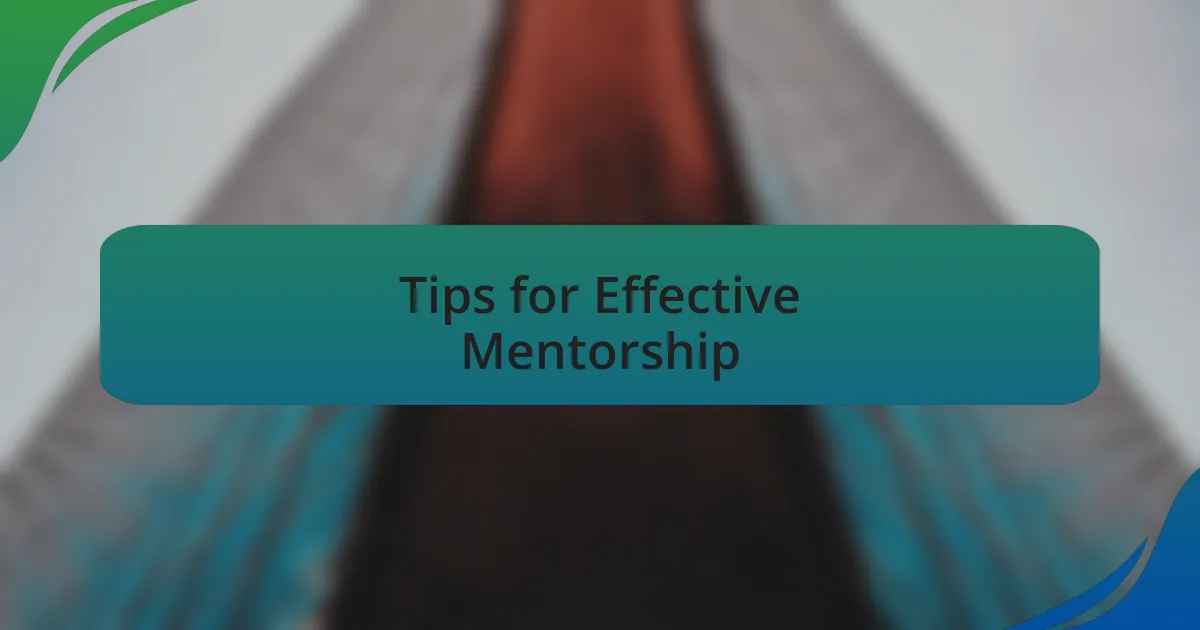
Tips for Effective Mentorship
When it comes to effective mentorship, one critical aspect is being fully present during your interactions. I recall a mentee who often felt dismissed, not because of my intent, but because I sometimes let distractions pull my focus. Once I committed to putting away my phone and really engaging, the depth of our conversations skyrocketed. Have you ever noticed how different the energy feels when both parties are truly attentive? That simple shift turned our mentorship into a collaborative partnership.
Transparency is another cornerstone of successful mentorship. I remember sharing my own failures with a mentee who was afraid of making mistakes. By opening up about my missteps, I created a space where they felt safe to embrace their own challenges. It’s enlightening to see how vulnerability can foster resilience—doesn’t it make you rethink the way we approach our own setbacks? Offering honest insights not only builds trust but also encourages a growth mindset in your mentee.
Lastly, adaptability is key. Each mentee comes with their own set of experiences and expectations, shaped by their unique backgrounds. I once worked with a very analytical thinker who thrived on structured guidance, while another mentee needed a more fluid approach to explore their creative potential. Do we ever consider how our mentoring styles must evolve as we work with diverse individuals? Embracing this flexibility allowed me to tailor my approach, and in turn, it empowered my mentees to find their own paths.